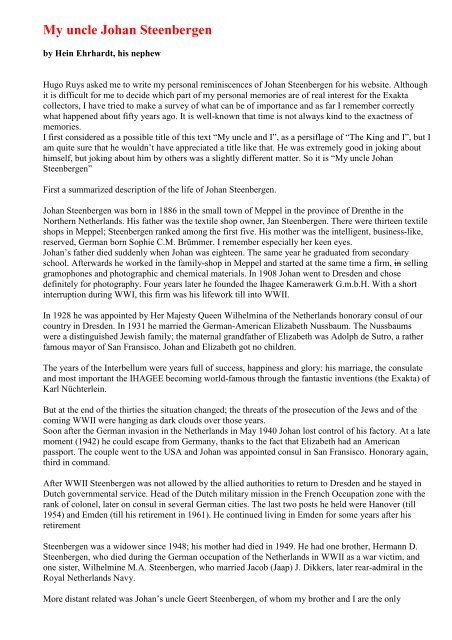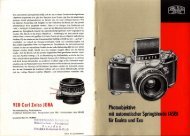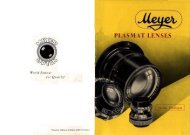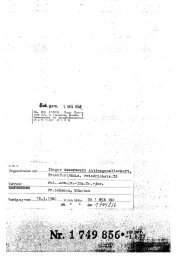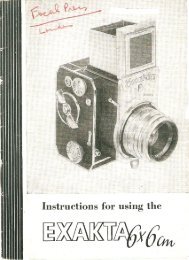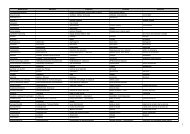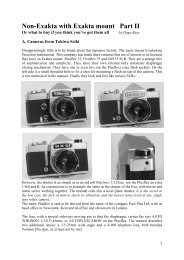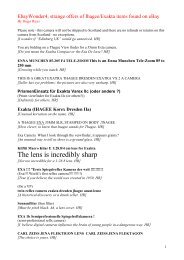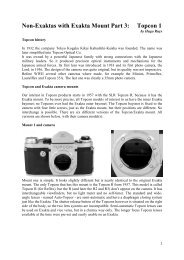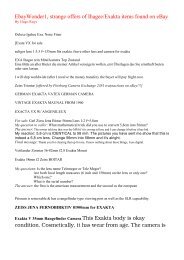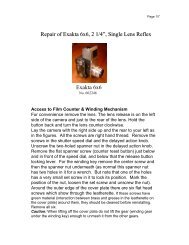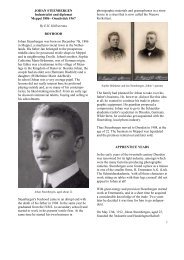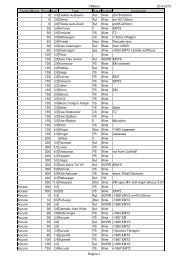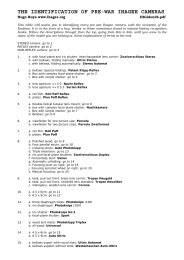My uncle Johan Steenbergen - Ihagee & Exakta Products and History
My uncle Johan Steenbergen - Ihagee & Exakta Products and History
My uncle Johan Steenbergen - Ihagee & Exakta Products and History
You also want an ePaper? Increase the reach of your titles
YUMPU automatically turns print PDFs into web optimized ePapers that Google loves.
<strong>My</strong> <strong>uncle</strong> <strong>Johan</strong> <strong>Steenbergen</strong><br />
by Hein Ehrhardt, his nephew<br />
Hugo Ruys asked me to write my personal reminiscences of <strong>Johan</strong> <strong>Steenbergen</strong> for his website. Although<br />
it is difficult for me to decide which part of my personal memories are of real interest for the <strong>Exakta</strong><br />
collectors, I have tried to make a survey of what can be of importance <strong>and</strong> as far I remember correctly<br />
what happened about fifty years ago. It is well-known that time is not always kind to the exactness of<br />
memories.<br />
I first considered as a possible title of this text “<strong>My</strong> <strong>uncle</strong> <strong>and</strong> I”, as a persiflage of “The King <strong>and</strong> I”, but I<br />
am quite sure that he wouldn’t have appreciated a title like that. He was extremely good in joking about<br />
himself, but joking about him by others was a slightly different matter. So it is “<strong>My</strong> <strong>uncle</strong> <strong>Johan</strong><br />
<strong>Steenbergen</strong>”<br />
First a summarized description of the life of <strong>Johan</strong> <strong>Steenbergen</strong>.<br />
<strong>Johan</strong> <strong>Steenbergen</strong> was born in 1886 in the small town of Meppel in the province of Drenthe in the<br />
Northern Netherl<strong>and</strong>s. His father was the textile shop owner, Jan <strong>Steenbergen</strong>. There were thirteen textile<br />
shops in Meppel; <strong>Steenbergen</strong> ranked among the first five. His mother was the intelligent, business-like,<br />
reserved, German born Sophie C.M. Brümmer. I remember especially her keen eyes.<br />
<strong>Johan</strong>’s father died suddenly when <strong>Johan</strong> was eighteen. The same year he graduated from secondary<br />
school. Afterwards he worked in the family-shop in Meppel <strong>and</strong> started at the same time a firm, in selling<br />
gramophones <strong>and</strong> photographic <strong>and</strong> chemical materials. In 1908 <strong>Johan</strong> went to Dresden <strong>and</strong> chose<br />
definitely for photography. Four years later he founded the <strong>Ihagee</strong> Kamerawerk G.m.b.H. With a short<br />
interruption during WWI, this firm was his lifework till into WWII.<br />
In 1928 he was appointed by Her Majesty Queen Wilhelmina of the Netherl<strong>and</strong>s honorary consul of our<br />
country in Dresden. In 1931 he married the German-American Elizabeth Nussbaum. The Nussbaums<br />
were a distinguished Jewish family; the maternal gr<strong>and</strong>father of Elizabeth was Adolph de Sutro, a rather<br />
famous mayor of San Fransisco. <strong>Johan</strong> <strong>and</strong> Elizabeth got no children.<br />
The years of the Interbellum were years full of success, happiness <strong>and</strong> glory: his marriage, the consulate<br />
<strong>and</strong> most important the IHAGEE becoming world-famous through the fantastic inventions (the <strong>Exakta</strong>) of<br />
Karl Nüchterlein.<br />
But at the end of the thirties the situation changed; the threats of the prosecution of the Jews <strong>and</strong> of the<br />
coming WWII were hanging as dark clouds over those years.<br />
Soon after the German invasion in the Netherl<strong>and</strong>s in May 1940 <strong>Johan</strong> lost control of his factory. At a late<br />
moment (1942) he could escape from Germany, thanks to the fact that Elizabeth had an American<br />
passport. The couple went to the USA <strong>and</strong> <strong>Johan</strong> was appointed consul in San Fransisco. Honorary again,<br />
third in comm<strong>and</strong>.<br />
After WWII <strong>Steenbergen</strong> was not allowed by the allied authorities to return to Dresden <strong>and</strong> he stayed in<br />
Dutch governmental service. Head of the Dutch military mission in the French Occupation zone with the<br />
rank of colonel, later on consul in several German cities. The last two posts he held were Hanover (till<br />
1954) <strong>and</strong> Emden (till his retirement in 1961). He continued living in Emden for some years after his<br />
retirement<br />
<strong>Steenbergen</strong> was a widower since 1948; his mother had died in 1949. He had one brother, Hermann D.<br />
<strong>Steenbergen</strong>, who died during the German occupation of the Netherl<strong>and</strong>s in WWII as a war victim, <strong>and</strong><br />
one sister, Wilhelmine M.A. <strong>Steenbergen</strong>, who married Jacob (Jaap) J. Dikkers, later rear-admiral in the<br />
Royal Netherl<strong>and</strong>s Navy.<br />
More distant related was <strong>Johan</strong>’s <strong>uncle</strong> Geert <strong>Steenbergen</strong>, of whom my brother <strong>and</strong> I are the only
gr<strong>and</strong>children. <strong>Johan</strong> had no other <strong>uncle</strong>s or aunts with offspring. Even the distant family was very small.<br />
So my mother was a <strong>Steenbergen</strong> <strong>and</strong> a first cousin of <strong>Johan</strong>, <strong>and</strong> that is where I come in.<br />
When I was born in 1926 on one of the southern isl<strong>and</strong>s of the Netherl<strong>and</strong>s, where my father was<br />
postmaster, there were in fact hardly any contacts with <strong>Johan</strong> in Dresden. I wonder whether he was<br />
informed about my birth.<br />
The contacts with the other members of that branch of the family were better. I remember aunt Sophie,<br />
aunt Wilhemine <strong>and</strong> <strong>uncle</strong> Hermann turning up at the 70th birthday of my gr<strong>and</strong>mother <strong>Steenbergen</strong> in<br />
1932.<br />
The only thing I knew about <strong>Johan</strong> was, that there was a kind of an <strong>uncle</strong> in Dresden who had a factory in<br />
cameras <strong>and</strong> who had, on the occasion of the visit of Queen Wilhelmina’s consort to the factory,<br />
presented a camera for Crown Princess Juliana. An often repeated story. (Worth mentioning is that the<br />
camera has indeed been used by H.R.H.; it was sent in for maintenance every year till WWII).<br />
Then the situation changed. <strong>My</strong> father died in 1938 <strong>and</strong> my mother, my gr<strong>and</strong>mother, my brother <strong>and</strong> I<br />
went to live in Delft, where my brother started studying at the Technical University. About the same time<br />
rear-admiral Dikkers left active service <strong>and</strong> went to live in the Hague, a city almost on walking distance<br />
from Delft. So the cousins Wilhelmine Dikkers <strong>and</strong> Nora Ehrhardt <strong>and</strong> their families lived nearby <strong>and</strong><br />
immediately the contact became close <strong>and</strong> cordial again. When <strong>Johan</strong> <strong>and</strong> Elizabeth were in the<br />
Netherl<strong>and</strong>s in spring 1942 to bid farewell to <strong>Johan</strong>’s mother <strong>and</strong> family in the Hague before leaving for<br />
the United States, they paid a visit to my mother in Delft. That was the first time I ever saw <strong>Johan</strong>.<br />
Looking back it is remarkable that the German authorities granted permission to <strong>Johan</strong> <strong>and</strong> his Jewish<br />
wife for such a visit to occupied Holl<strong>and</strong>.<br />
I remember that visit very clearly. We were living rather peaceful - my widowed mother with her mother<br />
<strong>and</strong> her two sons. The consequences of the war were not so hard for us then. Life was not very eventful.<br />
So the visit of <strong>uncle</strong> <strong>Johan</strong> <strong>and</strong> aunt Lizz was something special. It was a quiet sunny day. A rather plump<br />
couple, who paid a kind of courtesy call (tea of course <strong>and</strong> hardly anything else as was the habit in those<br />
years). People coming from another world <strong>and</strong> going to another world, just for a moment parachuted. No<br />
emotions were shown, no kissing. I never saw aunt Lizz again.<br />
But <strong>Johan</strong> came safely back to Europe after WWII, <strong>and</strong> in his first function as colonel in the French<br />
occupation zone he often came to the Hague to see his family <strong>and</strong> during those visits we also saw him<br />
frequently in Delft. <strong>My</strong> brother <strong>and</strong> I became better acquainted with him. Full colonel in uniform, very<br />
much joking about his high military status. A remarkable position for a man who had no affinity with the<br />
military world, which as a consequence he did not take very serious. He was always telling jokes about<br />
some amusing experience he had, mostly exaggerated <strong>and</strong> only partly true. His main story at that time<br />
was that he asked whom he had to salute first. The instruction was: only those who have a read ribbon<br />
around their cap. So he saluted ceremonially the doorman of a hotel who wore such a cap. People<br />
generally liked his jokes, also because he could laugh so contagiously. His funny stories he told often at<br />
the arrival of visitors to break the ice.<br />
Aunt Lizz came over after some time, very ill, from San Francisco <strong>and</strong> died in 1949. Not uncommon in<br />
those years she was at first treated in Germany by a fake doctor, who was not qualified at all.<br />
Then there were some changes. <strong>Johan</strong> held several consular posts in Germany, <strong>and</strong> I had finished my<br />
study in civil engineering at the Technical University Delft <strong>and</strong> had got a job at the public works<br />
department of the province of Friesl<strong>and</strong> in the northern part of the Netherl<strong>and</strong>s <strong>and</strong> moved there.<br />
In 1953 my mother <strong>and</strong> I got an invitation to visit <strong>Johan</strong> <strong>Steenbergen</strong> with Pentecost in Hanover, where he<br />
resided as consul of the Netherl<strong>and</strong>s. It was the first time I saw him in function <strong>and</strong> as host, <strong>and</strong> I was<br />
impressed. He was living in a magnificent pre-war house with a beautiful garden. Two very dedicated<br />
maid-servants, housekeepers. One of them mainly for the cooking (excellent) <strong>and</strong> one more especially for<br />
the more representative tasks, like serving at dinner, answering the doorbell. All the other house work<br />
they did together. We made a tour through the Harz with some of his friends.<br />
As hardly more than a student I did not always applaud automatically the things he said or showed, as all<br />
other guests used to do. Even years later he came, hardly amused, back on my negative comments on the
town hall of the city of Hanover.<br />
The furniture in the house was a rather mixed lot of some of his old furniture from Dresden that somehow<br />
had been transported to West-Germany, furniture of his late mother, <strong>and</strong> a number of things he had<br />
bought from his predecessor in Hanover.<br />
But what I remember most of that first visit was his impressive warm charisma. We went on well <strong>and</strong> my<br />
mother enjoyed the trip too.<br />
A comment of the housekeepers in later years on the Hanover-period was that <strong>Steenbergen</strong> went out often<br />
in the evening with his second-in-comm<strong>and</strong>, went to bed at five <strong>and</strong> was relaxed in his office at eight. He<br />
must have been very strong <strong>and</strong> needed little sleep. I have the impression that he was happy in Hanover.<br />
He was socially very active.<br />
Then something unexpected happened. <strong>Johan</strong> was transferred in 1954 to Emden, a harbour town near the<br />
Dutch-German border. In that region were great difficulties between the Germans <strong>and</strong> the Dutch about the<br />
exact border in the estuary of the river Ems between the two countries. It was a matter of great concern<br />
for which our government needed a reliable man on the spot.<br />
At first <strong>uncle</strong> <strong>Johan</strong> did not like the remote, destroyed (still suffering from the damage done in WWII by<br />
allied air raids) city of Emden, situated in a very backward rural area. But very soon he felt very much at<br />
home in Emden.<br />
The north of the Netherl<strong>and</strong>s. At left the province Friesl<strong>and</strong>. Hein Ehrhardt lived (<strong>and</strong> lives now)<br />
in its capital Leeuwarden. The white part to the right is the western part of Germany. In the top area,<br />
called East-Friesl<strong>and</strong>, lies the city of Emden, where <strong>Steenbergen</strong> was consul. The bay under Emden,<br />
with the dotted border line, was the problem area that <strong>Steenbergen</strong> had to deal with.<br />
I was still working <strong>and</strong> living alone in Leeuwarden <strong>and</strong> so was <strong>uncle</strong> <strong>Johan</strong> in Emden (on a rather short<br />
distance from Leeuwarden), so I started to visit him rather often. A good friendship developed with all the<br />
distance between generations usual in those years. A warm <strong>uncle</strong>-nephew contact. Family ties were<br />
important for him; he was very close with his sister (his nearest relation in that period) <strong>and</strong> her family. He<br />
was cherishing the memory of his wife, his mother <strong>and</strong> his brother Hermann.<br />
What was the position of my <strong>uncle</strong> in Emden in those years?<br />
He was popular, well-known, he intervened in conflicts between the two countries in that part of<br />
Germany <strong>and</strong> North-East Holl<strong>and</strong> <strong>and</strong> restored normal relations with great success. He was accepted by<br />
the Germans as partly one of them, since he had owned an important industry in East-Germany <strong>and</strong> had<br />
lost it. The story goes that he was asked sometimes to be a mediator in local conflicts in his domain. An
element must have been that in remote, destroyed post-war Emden a man of his international experience<br />
<strong>and</strong> “quality” must have been a rare phenomenon.<br />
He maintained contact with a large number of people in the region <strong>and</strong> received them in his house during<br />
endless dinners, lunches <strong>and</strong> cocktail parties. His parties in honour of the Queen’s birthday were<br />
highlights in the Emden of the nineteen fifties <strong>and</strong> early sixties. In that period <strong>and</strong> region it was a novum.<br />
He enjoyed having guests. Dinners ended always with a short slide-show to give the guests the<br />
opportunity to sleep for a moment. He was very alert not to invite persons with a Nazi-background. The<br />
ladies from Hanover continued to take care of him in Emden. I consider it impressive that he managed<br />
after the war, nearing sixty, to build a new career. In the opinion of some-well informed people his<br />
achievements in Hanover <strong>and</strong> Emden were hardly of less importance than those in pre-war Dresden. He<br />
was happy <strong>and</strong> fond of quite a number of people in Emden. The relationship with the main authorities: the<br />
“Regierungspräsident” (the head of the regional government), the mayor of Emden <strong>and</strong> the president of<br />
the Chamber of Commerce was more than perfect. He did not have real close personal friends. Somehow<br />
he wanted to keep some distance; not wanting to become too much connected. Once I was asked to<br />
become a member of a service-club in my hometown. His advice was negative: do not become to much<br />
involved. A very wise advice, which I did not follow.<br />
He was conservative, in fact liberal (he felt in Germany at home with the ideas of the German liberals<br />
from the FDP), protestant but not very active in religious matters. Normally he was kind to people.<br />
Walking on the walls of Emden we once met a couple that started to greet him very cordially. <strong>My</strong> <strong>uncle</strong> in<br />
his dark coat lifted his black hat of with a beautiful gesture, “what a pleasure to see you”, etc. etc.<br />
Afterwards: I had no idea who they were. But the couple was very pleased. I practice that system now.<br />
He was not kind to people who did not do their duty. When someone, which whom he had to do, did<br />
something he disapproved of, it took a long time before the relationship was repaired. If ever. He must<br />
have been a rather dem<strong>and</strong>ing boss. Once he invited the whole family for Christmas <strong>and</strong> did not even<br />
realize that it was not so normal that the housekeepers had to work at Christmas <strong>and</strong> couldn’t go home.<br />
The ladies complained <strong>and</strong> the problem was solved. “The girls” had by-the-way a very sharp insight in<br />
the family, the characters <strong>and</strong> the relationships. Perhaps more than anyone in the <strong>Steenbergen</strong> family ever.<br />
Uncle <strong>Johan</strong> dem<strong>and</strong>ed much of others, but also of himself. He was hardly ever negative about others.<br />
But perhaps he was the wise old man, who never comments negatively on anybody.<br />
Punctual until the last detail. Once I asked him if he really needed, after half a century in Germany, a
German secretary on the consulate. The answer was: Yes I do; as a foreigner you never learn to write<br />
German faultlessly.<br />
He was careful in his actions. The year after the construction of the Berlin wall two friends from<br />
Leeuwarden <strong>and</strong> I planned to make a short trip to Berlin. He was worried; it is dangerous <strong>and</strong> none of<br />
your business. He was absolutely right. We went all the same <strong>and</strong> came back safely with a number of<br />
interesting stories. But perhaps he was also afraid of being involved in case of incidents.<br />
He was punctual to the extreme in his financial bookkeeping. He could spend hours in searching in his<br />
administration for the last cents that couldn’t be traced back. He helped people where possible, but as far<br />
as I know not very often with money. Helping e.g. with endless food parcels to his pre-war contacts from<br />
the IHAGEE in Dresden. For his own needs he was also reluctant to spend money.<br />
I accompanied him on a number of official social duties, varying from openings of art exhibitions,<br />
twinning visits with the Netherl<strong>and</strong>s, visits of navy vessels, to him presiding jury’s of flower parades. He<br />
enjoyed those happenings tremendously. Somehow my youthful presence was something extra. At several<br />
occasions a German authority expressed the pleasure to see a youngster, seldom seen in post-war<br />
Germany.<br />
<strong>Johan</strong> <strong>Steenbergen</strong>, Royal Consul of The Netherl<strong>and</strong>s, has the honour to politely invite<br />
Ir. H. Ehrhardt to dinner on Tuesday, the 9th of August 1955, at 7.30pm in Emden, Aurich Street 83.<br />
Please respond on August 1st at the latest to the Royal Dutch Consulate, tel 2004. Dress: casual.<br />
<strong>My</strong> <strong>uncle</strong> <strong>and</strong> I often went for a walk during my visits <strong>and</strong> we always got lost, because we <strong>Steenbergen</strong>s<br />
are bad at orientation. We enjoyed the perfect meals of his cook <strong>and</strong> we made small tours with my<br />
Citroën 2CV through the poor but very unspoilt countryside. We laughed <strong>and</strong> talked. Uncle <strong>Johan</strong><br />
certainly showed interest in my affairs (with managers <strong>and</strong> colleagues from my office we made two study<br />
tours to his region, organized by <strong>Steenbergen</strong>, <strong>and</strong> of course were invited for a dinner in his home), but<br />
mostly I listened. He once told me about his negotiations (for solving the problem of the border in the<br />
estuary he created the necessary atmosphere) <strong>and</strong> his activities towards the authorities <strong>and</strong> other local<br />
people. Main aspect: never be too close, be hospitable <strong>and</strong> build a network.
A topic was always the IHAGEE. Although he did not believe in a reunited Germany, he never accepted<br />
the loss of the IHAGEE. Certainly not only while he lost so much money, but is was his child, a child that<br />
came first in his life until the end.<br />
I am not sure whether he expected the IHAGEE West to become a success. I think it seemed already from<br />
the beginning to be a tragic history <strong>and</strong> most likely he knew it. Certainly it was also difficult for him to<br />
except that the IHAGEE West was not his own firm. He was always careful not to damage the interests of<br />
the company in Dresden, even after the founding of the IHAGEE West. He talked at length about the<br />
negotiations. Now I regret that I do not remember everything he said. A secret diary from that time would<br />
have been very useful now. Photography was never an item of discussion.<br />
<strong>Johan</strong> <strong>Steenbergen</strong> left Emden in 1964 <strong>and</strong> died in Osnabrück in 1967, well-looked after by his faithful<br />
housekeepers. I visited him several times during his last illness.<br />
I was asked many times what his influence in my life has been <strong>and</strong> is. How did he contribute in the<br />
making of the kind of man I am now. As may be clear, it was only a short period that <strong>Johan</strong> <strong>Steenbergen</strong><br />
was rather prominently present in my life, <strong>and</strong> that the contacts were certainly not frequent. But I learned<br />
very much from him <strong>and</strong> his behaviour. He certainly belongs to the key figures in my life. I admired him.<br />
The main point certainly was the importance of networking, how to do that <strong>and</strong> at the same time the<br />
pleasure of doing so. I have practiced that the rest of my life, both in my professional <strong>and</strong> social life,<br />
making also life more comfortable through “collecting” interesting people around me.<br />
In those years the community in which I lived was rather restricted; the world of my <strong>uncle</strong> gave a broader,<br />
refreshing view on life. <strong>My</strong> interest in international professional organizations in water quality<br />
management, in which I held some small functions, <strong>and</strong> in traveling was certainly stimulated by what I<br />
heard <strong>and</strong> saw in Emden.<br />
He learned me that it is often wise to hold business meetings at home. There is always less tension there,<br />
<strong>and</strong> the hospitality makes the atmosphere better . I still do so to-day. And when it is necessary to<br />
introduce someone with rank, give them just one level higher. Mr. director-general for the director. They<br />
are always flattered. And when telling a story, a small gossip, never, never mention the source.<br />
I have used some of his jokes for many years, but I never followed his precise bookkeeping <strong>and</strong> although<br />
matters of money are important to me, never on that scale. I have never expected that after so many years<br />
there should be such a vivid interest in what my beloved <strong>uncle</strong> has attained. Touching, <strong>and</strong> giving me a lot<br />
of work too.<br />
The history of the charitable <strong>Steenbergen</strong>-Stichting (Foundation) which he founded in 1961 in memory of<br />
his brother Hermann <strong>and</strong> which I have the pleasure to chair, is another story. If interested see the website<br />
http://www.steenbergen-stichting.nl<br />
Leeuwarden, The Netherl<strong>and</strong>s, December 2003<br />
Hein Ehrhardt


